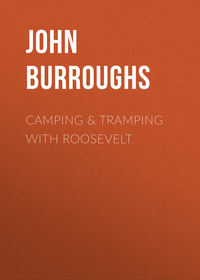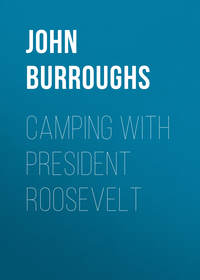 полная версия
полная версияUnder the Maples
On August the 31st we made our camp on the banks of a large, clear creek in West Virginia called Horseshoe Run. A smooth field across the road from the creek seemed attractive, and I got the reluctant consent of the widow who owned it to pitch our camp there, though her patch of roasting-ears near by made her hesitate; she had probably had experiences with gypsy parties, and was not impressed in our favor even when I gave her the names of two well-known men in our party. But Edison was not attracted by the widow's open field; the rough, grassy margin of the creek suited him better, and its proximity to the murmuring, eddying, rocky current appealed to us all, albeit it necessitated our mess-tent being pitched astride a shallow gully, and our individual tents elbowing one another in the narrow spaces between the boulders. But wild Nature, when you can manage her, is what the camper-out wants. Pure elements – air, water, earth – these settle the question; Camp Horseshoe Run had them all. It was here, I think, that I got my first view of the nonpareil, or painted bunting – a bird rarely seen north of the Potomac.
An interesting object near our camp was an old, unused grist-mill, with a huge, decaying overshot oaken water-wheel. We all perched on the wheel and had our pictures taken.
At our lunch that day, by the side of a spring, a twelve-year-old girl appeared in the road above us with a pail of apples for sale. We invited her into our camp, an invitation she timidly accepted. We took all of her apples. I can see her yet with her shining eyes as she crumpled the new one-dollar bill which one of the party placed in her hand. She did not look at it; the feel of it told the story to her. We quizzed her about many things and got straight, clear-cut answers – a very firm, level-headed little maid. Her home was on the hill above us. We told her the names of some of the members of the party, and after she had returned home we saw an aged man come out to the gate and look down upon us. An added interest was felt whenever we came in contact with any of the local population. Birds and flowers and trees and springs and mills were something, but human flowers and rills of human life were better. I do not forget the other maiden, twelve or thirteen years old, to whom we gave a lift of a few miles on her way. She had been on a train five times, and once had been forty miles from home. Her mother was dead and her father lived in Pennsylvania, and she was living with her grandfather. When asked how far it was to Elkins she said, "Ever and ever so many miles."
The conspicuous roadside flowers for hundreds of miles, in fact, all the way from Pennsylvania to North Carolina, were the purple eupatorium, or Joe-Pye-weed, and the ironweed – stately, hardy growths, and very pleasing to look upon, the ironweed with its crimson purple, and the eupatorium with its massive head of soft, pinkish purple.
August the 22d we reached Cheat River in West Virginia, a large, clear mountain trout-brook. It crossed our path many times that day. Every mountain we crossed showed us Cheat River on the other side of it. It was flowing by a very devious course northwest toward the Ohio. We were working south and east.
We made our camp that night on the grounds of the Cheat Mountain Club, on the banks of the river – an ideal spot. The people at the big clubhouse gave us a hospitable welcome and added much to our comfort. I found the forests and streams of this part of West Virginia much like those of the Catskills, only on a larger scale, and the climate even colder. That night the mercury dropped to thirty. On June the 24th they had a frost that killed all their garden truck. The paper outlines of big trout which covered the walls in the main room of the clubhouse told the story of the rare sport the club-members have there. Evidently Cheat River deserves a better name.
The mountains and valleys of the Virginias all present a marked contrast to those of New York and Pennsylvania. They were not rubbed down and scooped out by the great ice-sheet that played such a part in shaping our northern landscapes. The valleys are markedly V-shaped, while ours are markedly U-shaped. The valley sides are so steep that they are rarely cultivated; the farm land for the most part lies on the tops of the broad, rounded hills, though we passed through some broad, open river valleys that held miles upon miles of beautiful farms in which hay and oats were still being harvested. Everywhere were large fields of buckwheat, white with bloom, and, I presume, humming with bees.
Here and there, by the rocks and the boulders strewn over the landscape, I saw evidences of large local glaciers that had hatched in these mountains during the great Ice Age.
We made camp at Bolar Springs on August the 23d – a famous spring, and a beautiful spot. We pitched our tents among the sugar maples, and some of the party availed themselves of the public bathhouse that spanned the overflow of the great spring. The next night our camp was at Wolf Creek, not far from the Narrows – a beautiful spot, marred only by its proximity to the dusty highway. It was on the narrow, grassy margin of a broad, limpid creek in which the fish were jumping. Some grazing horses disturbed my sleep early in the morning, but on the whole I have only pleasant memories of our camp at Wolf Creek.
We were near a week in Virginia and West Virginia, crossing many times the border between the two States, now in one, then in the other, all the time among the mountains, with a succession of glorious views from mountain-tops and along broad, fertile valleys. Now we were at Warm Springs, then at Hot Springs, then at White Sulphur, or at Sweet Water Springs. Soft water and hard water, cold water and warm water, mineral water and trout-streams, companion one another in these mountains. This part of the continent got much folded and ruptured and mixed up in the building, and the elements are unevenly distributed.
I think to most of us West Virginia had always been a rather hazy proposition, and we were glad to get a clear impression of it. We certainly became pretty intimate with the backbone of the continent – or with its many backbones, as its skeleton seems to be a very multiplex affair. The backbones of continents usually get broken in many places, but they serve their purpose just as well. In fact, our old Earth is more like an articulate than a vertebrate. Its huge shell is in many sections.
One of our camps we named Camp Lee, the name of the owner of the farm. One of the boys there, Robert E. Lee, made himself very useful in bringing wood and doing other errands.
A privation, which I think Mr. Edison and I felt more than did the others, was the scanty or delayed war news; the local papers, picked up here and there, gave only brief summaries, and when in the larger towns we could get some of the great dailies, the news was a day or two old. When one has hung on the breath of the newspapers for four exciting years, one is lost when cut off from them.
Such a trip as we were taking was, of course, a kind of a lark, especially to the younger members of the party. Upon Alleghany Mountain, near Barton, West Virginia, a farmer was cradling oats on a side-hill below the road. Our procession stopped, and the irrepressible Ford and Firestone were soon taking turns at cradling oats, but with doubtful success. A photograph shows the farmer and Mr. Ford looking on with broad smiles, watching Mr. Firestone with the fingers of the cradle tangled in the oats and weeds, a smile on his face also, but decidedly an equivocal smile – the trick was not so easy as it looked. Evidently Mr. Ford had not forgotten his cradling days on the home farm in Michigan.
Camp-life is a primitive affair, no matter how many conveniences you have, and things of the mind keep pretty well in the background. Occasionally around the camp-fire we drew Edison out on chemical problems, and heard formula after formula come from his lips as if he were reading them from a book. As a practical chemist he perhaps has few, if any, equals in this country. It was easy to draw out Mr. Ford on mechanical problems. There is always pleasure and profit in hearing a master discuss his own art.
A plunge into the South for a Northern man is in many ways a plunge into the Past. As soon as you get into Virginia there is a change. Things and people in the South are more local and provincial than in the North. For the most part, in certain sections, at least, the county builds the roads (macadam), and not the State. Hence you pass from a fine stone road in one county on to a rough dirt road in the next. Toll-gates appear. In one case we paid toll at the rate of two cents a mile for the cars, and five cents for the trucks. Grist-mills are seen along the way, driven by overshot wheels, and they are usually at work. A man or a boy on horseback, with a bag of grain or of meal behind him, going to or returning from the mill, is a frequent sight; or a woman on horseback, on a sidesaddle, with a baby in her arms, attracts your attention. Thus my grandmother went to mill in pioneer days in the Catskills.
The absence of bridges over the small streams was to us a novel feature. One of the party called these fording places, "Irish bridges." They are made smooth and easy, and gave us no trouble. Another Southern feature, indicating how far behind our Northern and more scientific farming the South still is, are the groups of small haystacks in the meadows with poles sticking out of their tops, letting the rain and the destructive bacteria into their hearts. Among the old-fashioned features of the South much to be commended are the large families. In a farmhouse near which we made camp one night there were thirteen children, the eldest of whom was at the front in France. The schools were in session in late August, and the schoolrooms were well filled with pupils.
No doubt there are many peculiar local customs of which the hurrying tourist gets no inkling. At a station in the mountains of North Carolina a youngish, well-clad countryman, smoking his pipe, stood within a few feet of my friend and me and gazed at us with the simple, blank curiosity of a child. There was not the slightest gleam of intelligent interest, or self-consciousness in his face; it was the frank stare of a five-year-old boy. He belongs to a type one often sees in the mountain districts of the South – good human stuff, valiant as soldiers, and industrious as farmers, but so unacquainted with the great outside world, their unsophistication is shocking to see.
It often seemed to me that we were a luxuriously equipped expedition going forth to seek discomfort, for discomfort in several forms – dust, rough roads, heat, cold, irregular hours, accidents – is pretty sure to come to those who go a-gypsying in the South. But discomfort, after all, is what the camper-out is unconsciously seeking. We grow weary of our luxuries and conveniences. We react against our complex civilization, and long to get back for a time to first principles. We cheerfully endure wet, cold, smoke, mosquitoes, black flies, and sleepless nights, just to touch naked reality once more.
Our two chief characters presented many contrasts: Mr. Ford is more adaptive, more indifferent to places, than is Mr. Edison. His interest in the stream is in its potential water-power. He races up and down its banks to see its fall, and where power could be developed. He never ceases to lament so much power going to waste, and points out that if the streams were all harnessed, as they could easily be, farm labor everywhere, indoors and out, could be greatly lessened. He dilates upon the benefit that would accrue to every country neighborhood if the water-power that is going to waste in its valley streams were set to work in some useful industry, furnishing employment to the farmers and others in the winter seasons when the farms need comparatively little attention. He is always thinking in terms of the greatest good to the greatest number. He aims to place his inventions within reach of the great mass of the people. As with his touring-car, so with his tractor engine, he has had the same end in view. Nor does he forget the housewife. He has plans afoot for bringing power into every household that will greatly lighten the burden of the women-folk.
Partly owing to his more advanced age, but mainly, no doubt, to his meditative and introspective cast of mind, Mr. Edison is far less active than is Mr. Ford. When we would pause for the midday lunch, or to make camp at the end of the day, Mr. Edison would sit in his car and read, or curl up, boy fashion, under a tree and take a nap, while Mr. Ford would inspect the stream or busy himself in getting wood for the fire. Mr. Ford is a runner and a high kicker, and frequently challenged some of the party to race with him. He is also a persistent walker, and from every camp, both morning and evening, he sallied forth for a brisk half-hour walk. His cheerfulness and adaptability on all occasions, and his optimism in regard to all the great questions, are remarkable. His good-will and tolerance are boundless. Notwithstanding his practical turn of mind, and his mastery of the mechanical arts and of business methods, he is through and through an idealist. As tender as a woman, he is much more tolerant. He looks like a poet, and conducts his life like a philosopher. No poet ever expressed himself through his work more completely than Mr. Ford has expressed himself through his car and his tractor engine. They typify him; not imposing, nor complex, less expressive of power and mass than of simplicity, adaptability, and universal service, they typify the combination of powers and qualities which make him a beneficent, a likable, and a unique personality. Those who meet him are invariably drawn to him. He is a national figure, and the crowds that flock around the car in which he is riding, as we pause in the towns through which we pass, are not paying their homage merely to a successful car-builder or business man, but to a beneficent human force, a great practical idealist whose good-will and spirit of universal helpfulness they have all felt. He has not only brought pleasure and profit into their lives, but has illustrated and written large upon the pages of current history a new ideal of the business man – that of a man whose devotion to the public good has been a ruling passion, and whose wealth has inevitably flowed from the depth of his humanitarianism. He has taken the people into partnership with him, and has eagerly shared with them the benefits that are the fruit of his great enterprise – a liberator, an emancipator, through channels that are so often used to enslave or destroy.
In one respect, essentially the same thing may be said of Mr. Edison: his first and leading thought has been, "What can I do to make life easier and more enjoyable to my fellow-men? He is a great chemist, a trenchant and original thinker on all the great questions of life, though he has delved but little into the world of art and literature – a practical scientist, plus a meditative philosopher of profound insight. And his humor is delicious. We delighted in his wise and witty sayings. A good camper-out, he turns vagabond very easily, can go with hair disheveled and clothes unbrushed as long as the best of us, and can rough it week in and week out and wear that benevolent smile. He eats so little that I think he was not tempted by the chicken-roosts or turkey-flocks along the way, nor by the cornfields and apple-orchards, as some of us were, but he is second to none in his love for the open and for wild nature.
Mr. Firestone belongs to an entirely different type – the clean, clear-headed, conscientious business type; always on his job, always ready for whatever comes; in no sense an outdoor man; always at the service of those around him; a man generous, kindly, appreciative, devoted to his family and his friends; sound in his ideas – a manufacturer who has faithfully and honestly served his countrymen.
It is after he gets home that a meditative man really makes such a trip. All the unpleasant features are strained out or transformed. In retrospect it is all enjoyable, even the discomforts. I am aware that I was often irritable and ungracious, but my companions were tolerant, and gave little heed to the flitting moods of an octogenarian. Now, at this distance, and sitting beside my open fire at Slabsides, I look upon the whole trip with unmixed pleasure.
IX
UNDER GENIAL SKIES
I. A SUN-BLESSED LANDThe two sides of our great sprawling continent, the East and West, differ from each other almost as much as day differs from night. On the coast of southern California the dominant impression made upon one is of a world made up of three elements – sun, sea, and sky. The Pacific stretches away to the horizon like a vast, shining, gently undulating floor. Its waves are longer and come in more languidly than they do upon the Atlantic coast. It justifies its name. The passion and fury of the Eastern seas I got no hint of, even in winter. Its rocks, all that I saw of them, are soft and friable. The languid waves rapidly wear them down. They are non-strenuous rocks, lifted up out of a non-strenuous sea. The mountains that tower four or five thousand feet along the coast are of the same character. They are young, and while they carry their heads very high, they are soft and easily disintegrated compared with the granite of our coast.
As a rule, young mountains always wear the look of age, from their deep lines and jagged and angular character, while the really old mountains wear the look of youth from their comparative smoothness, their unwrinkled appearance, their long, flowing lines. Time has taken the conceit all out of them.
The annual rainfall in the Far West is only about one third of what it is on the eastern side of the continent. And the soil is curiously adapted to the climate. Trees flourish and crops are grown there under arid conditions that would kill every green thing on the Atlantic seaboard. The soil is clay tempered with a little sand, probably less than ten per cent of it by weight is sand. I washed the clay out of a large lump of it and found the sand a curious heterogeneous mixture of small and large, light and dark grains of all possible forms. The soil does not bake as do our clay soils, and keeps moist when ours would almost defy the plough. Under cultivation it works up into a good tillable condition. Its capacity to retain moisture is remarkable, as if it were made for a scant rainfall. As a crop-producing soil, it has virtues which I am at a loss to account for. Root vegetables grown here have a sweetness, and above all, a tenderness, of which we know nothing in the East. Much sunshine in our climate makes root vegetables fibrous and tough.
I more than half believe that the wonderful sweetness of the bird songs here, such as that of the meadowlark, is more or less a matter of climate; the quality of the sunshine seems to have affected their vocal cords. The clear, piercing, shaft-like note of our meadowlark contrasts with that of the Pacific variety as our hard, brilliant blue skies contrast with the softer and tenderer skies of this sun-blessed land.
II. LAWN BIRDSTo have a smooth grassy lawn about your house on the Pacific coast is to have spread out before you at nearly all hours of the day a pretty spectacle of wild-bird life. Warblers, sparrows, thrushes, titlarks, and plovers flutter across it as thick as autumn leaves – not so highly colored, yet showing a pleasing variety of tints, while the black ph[oe]be flits about your porch and arbor vines.
Audubon's warbler is the most numerous, probably ten to one of any other variety of birds. Then the white-crowned sparrows, Gambel's sparrow, the tree sparrow, and one or two other sparrows of which I am not sure are next in number.
Two species of birds from the Far North are usually represented by a solitary specimen of each, namely, the Alaska hermit thrush and the American pipit, or titlark. The thrush is silent, but has its usual trim, alert look. The pipit is the only walker in the group. It walks about like our oven-bird with the same pretty movement of the head and a teetering motion of the hind part of the body.
While in Alaska, in July, 1899, with the Harriman Expedition, I found the nest of the pipit far up on the side of a steep mountain. It was tucked in under a mossy tuft and commanded a view of sea and mountain such as Alaska alone can afford.
But the most conspicuous and interesting of all these lawn birds are the ring-necked plovers, or killdeers. Think of having a half-dozen or more of those wild, shapely creatures, reminiscent of the shore and of the spirit of the tender, glancing April days, running over your lawn but a few yards from you! Their dovelike heads, their long, slender legs, that curious, mechanical jerking up-and-down movement of their bodies, their shrill, disconsolate cries as they take flight, their beautiful and powerful wings and tail, and their mastery of the air – all arrest your attention or challenge your admiration. They bring the distant and the furtive to your very door. All climes and lands wait upon their wings. They fly around the world.
The plovers are the favored among birds. Beauty, speed, and immunity from danger from birds of prey are theirs. Ethereal and aerial creatures! Is that the cry of the sea in the bird's voice? Is that the motion of the waves in its body? Is that the restlessness of the surf in its behavior?
However high and far it may fly, it has to come back to earth as we all do. It comes to our lawn to feed upon earthworms. The other birds are all busy picking up some minute fly or insect that harbors in the grass, but the plover is here for game that harbors in the turf. His methods are like those of the robin searching for grubs or angle-worms. He scrutinizes the turf very carefully as he runs about over it, making frequent drives into it with his bill, but only now and then seizing the prey of which he is in search. When he does so, he shows the same judgment which the robin does under like conditions. He pulls slowly and evenly, so as to make sure of the whole worm, or to compel it to let go its hold upon the soil without breaking. All birds are wise about their food-supplies.
On the beach the wild life that I see is all on wings. There are the tranquil, effortless gliding herring gulls, snow-white beneath and pearl-gray above, displaying an affluence of wing-power restful to look upon – airplanes that put forth their powers so subtly and so silently as to elude both eye and ear. At low tide I see large groups of their white and gray-blue forms seated upon the dark, moss-covered rocks. Fresh water is at a premium on this coast, and the thirsty gulls avail themselves of the makeshift of the drain-pipes from the town, which discharge on the beach.
There are the clumsy-looking but powerful-winged birds, the brown pelicans, usually in a line of five or six, skimming low over the waves, shaping their course to the "hilly sea," often gliding on set wings for a long distance, rising and falling to clear the water – coasting, at it were, on a horizontal surface, and only at intervals beating the air for more power. They are heavy, awkward-looking birds with wings and forms that suggest none of the grace and beauty of the usual shore birds. They do not seem to be formed to cleave the air, or to part the water, but they do both very successfully. When the pelican dives for his prey, he is for the moment transformed into a thunderbolt. He comes down like an arrow of Jove, and smites and parts the water in superb style. When he recovers himself, he is the same stolid, awkward-looking creature as before.
A bird evidently not far removed from its reptilian ancestors – a bird that is at home under the water and hunts its prey there on the wing – is the black cormorant. There is a colony of several hundred of them on the face of a sea-cliff a short distance above me.
I see, at nearly all hours of the day, the black lines they make above the foaming breakers as they go and come on their foraging expeditions. In diving, they disappear under the water like the loon, and penetrate to as great depths. One does not crave an intimate acquaintance with them, but they are interesting as a part of the multitudinous life of the shore.
III. SILKEN CHAMBERSThe trap-door spider has furnished me with one of the most interesting bits of natural history I have found on the coast. An obliging sojourner near me from one of the Eastern States had discovered a large plot of uncultivated ground above the beach that abounded in the hidden burrows of these curious animals. One afternoon he volunteered to conduct me to the place.









